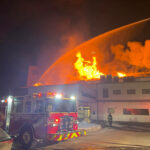Dartmouth College in Hanover, New Hampshire, is considering banning hard liquor on campus as part of a series of measures to curb student alcohol abuse and sexual assault.
President Philip Hanlon is expected to propose the change in a speech Thursday, according to a person familiar with the recommendations who asked not to be identified because they’re confidential.
Dartmouth, Brown University and other colleges are instituting or considering alcohol restrictions to promote safety on campus. Hanlon vowed to develop new policies last year, saying that misbehavior has damaged the school and its reputation.
“There is a sense that as part of the general reform of college campuses to make them safer, you’ve got to look at alcohol and alcohol policy,” said Peter Lake, director of the law and policy center at Stetson University. “It’s the elephant in the room.”
The Board of Trustees has approved Hanlon’s plan for the campus, according to an e-mail Wednesday to Dartmouth students, faculty and staff from Chairman William Helman. The e-mail didn’t give details of the plan.
The measure is likely to be controversial among students, said Andrew McKee, a senior majoring in women’s and gender studies. Drinking and sexual assault are serious problems, and a ban on hard liquor might help address them, he said.
The proposal “could end up being a really good measure, but I don’t think it should be the focus of a plan,” he said.
Cracking Down
Colleges are cracking down on drinking and dangerous behavior as U.S. lawmakers, activists and students have called attention to campus sexual assault. Studies suggest that many sexual assaults are linked to alcohol use and abuse.
Fraternity behavior has also come under scrutiny. Since 2005, more than 75 people across the U.S. have died in fraternity-related incidents, many involving alcohol, according to data compiled by Bloomberg. Fraternity and sorority members account for about 50 percent of Dartmouth’s student body.
At a Nov. 20 meeting, where about 20 percent of Dartmouth’s 600 faculty were present, teachers voted 116-to-13 in favor of a non-binding resolution to abolish the school’s Greek system.
Last year, Dartmouth applications fell 14 percent. Some faculty, students and alumni said that high-schoolers may have steered clear because of reports of drinking and sexual misconduct, though college officials attributed it to other factors. Applications have since rebounded in the current cycle.
Moving Forward
Last April, Hanlon, president since 2013, announced the initiative to improve the campus environment that he called Moving Dartmouth Forward. In a speech at the time, Hanlon condemned student alcohol abuse, intolerance and sexual misconduct.
“Dartmouth’s promise is being hijacked by extreme behavior, masked by its perpetrators as acceptable fun,” Hanlon said in the speech.
Students, faculty and staff were invited to propose and vet ideas. The school said it has already made strides in cutting high-risk drinking and developed sexual-assault prevention and education programs. Last year, Hanlon proposed and the board approved tougher punishments for students found responsible for sexual assault.
Related Articles:
- Colleges Look to Control Fraternities, Hazing As Tragic Incidents Multiply
- Education Dept.: Harvard Law School’s Response to Sex Assaults Violated Title IX
- Campus Culture Change: ‘Deadliest’ College Fraternity Nixes Pledging
- JPMorgan Snub, Lloyd’s Insurance Threat Spurred Change at SAE Fraternity
- Yale Fraternity and 86 Members Sued Over Fatal Tailgating Crash in Connecticut
Topics Education Universities
Was this article valuable?
Here are more articles you may enjoy.


 Fire at Pennsylvania Hospital Forces Evacuation of Dozens of Patients
Fire at Pennsylvania Hospital Forces Evacuation of Dozens of Patients  Trump’s Repeal of Climate Rule Opens a ‘New Front’ for Litigation
Trump’s Repeal of Climate Rule Opens a ‘New Front’ for Litigation  Pipeline Explodes at Delfin LNG Planned Project in Louisiana
Pipeline Explodes at Delfin LNG Planned Project in Louisiana  Insurify Starts App With ChatGPT to Allow Consumers to Shop for Insurance
Insurify Starts App With ChatGPT to Allow Consumers to Shop for Insurance 

